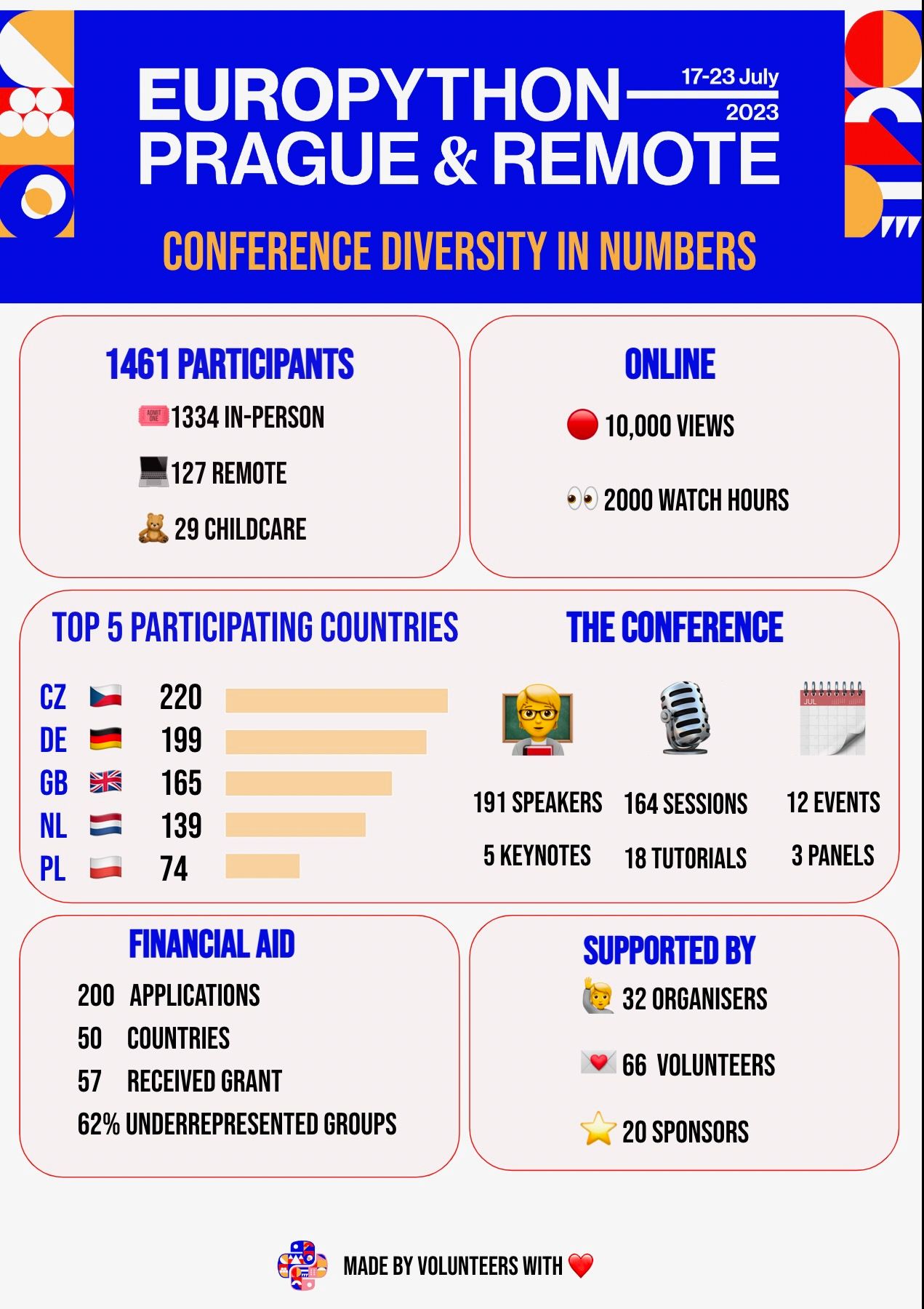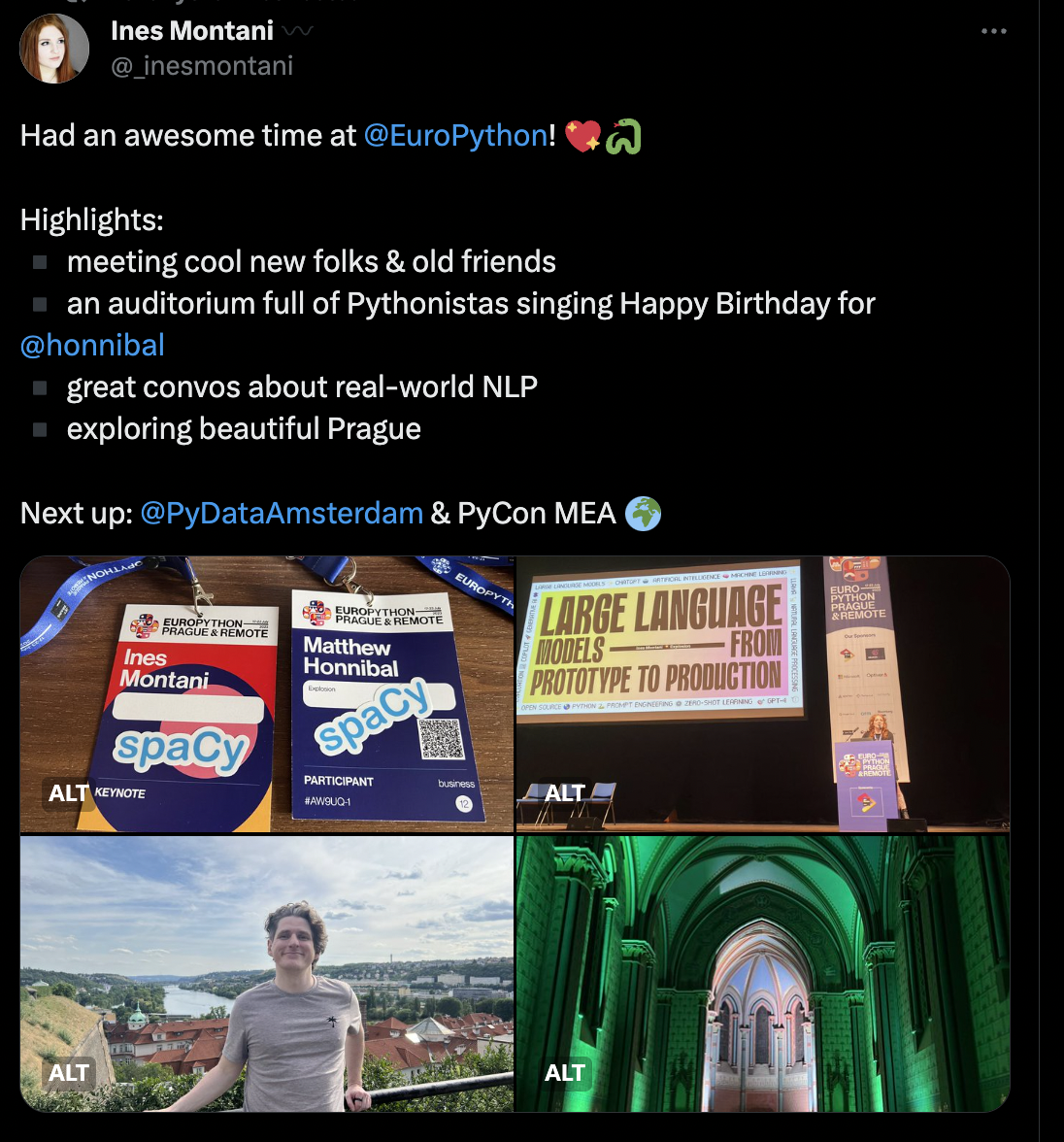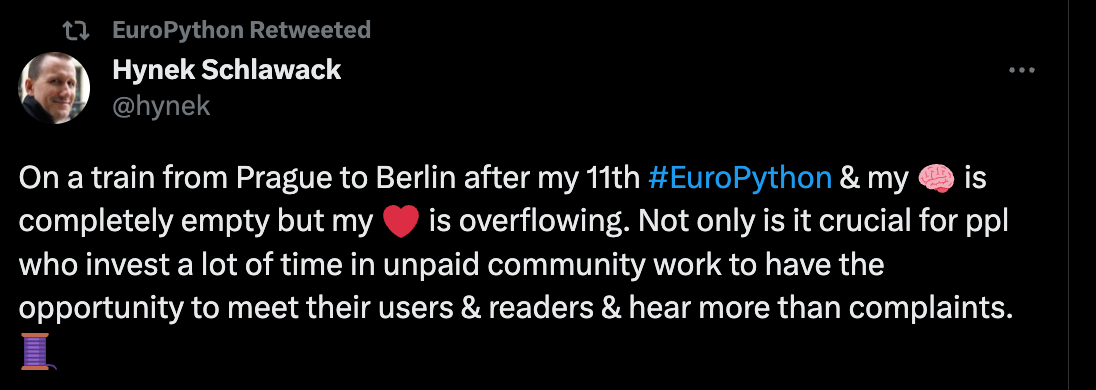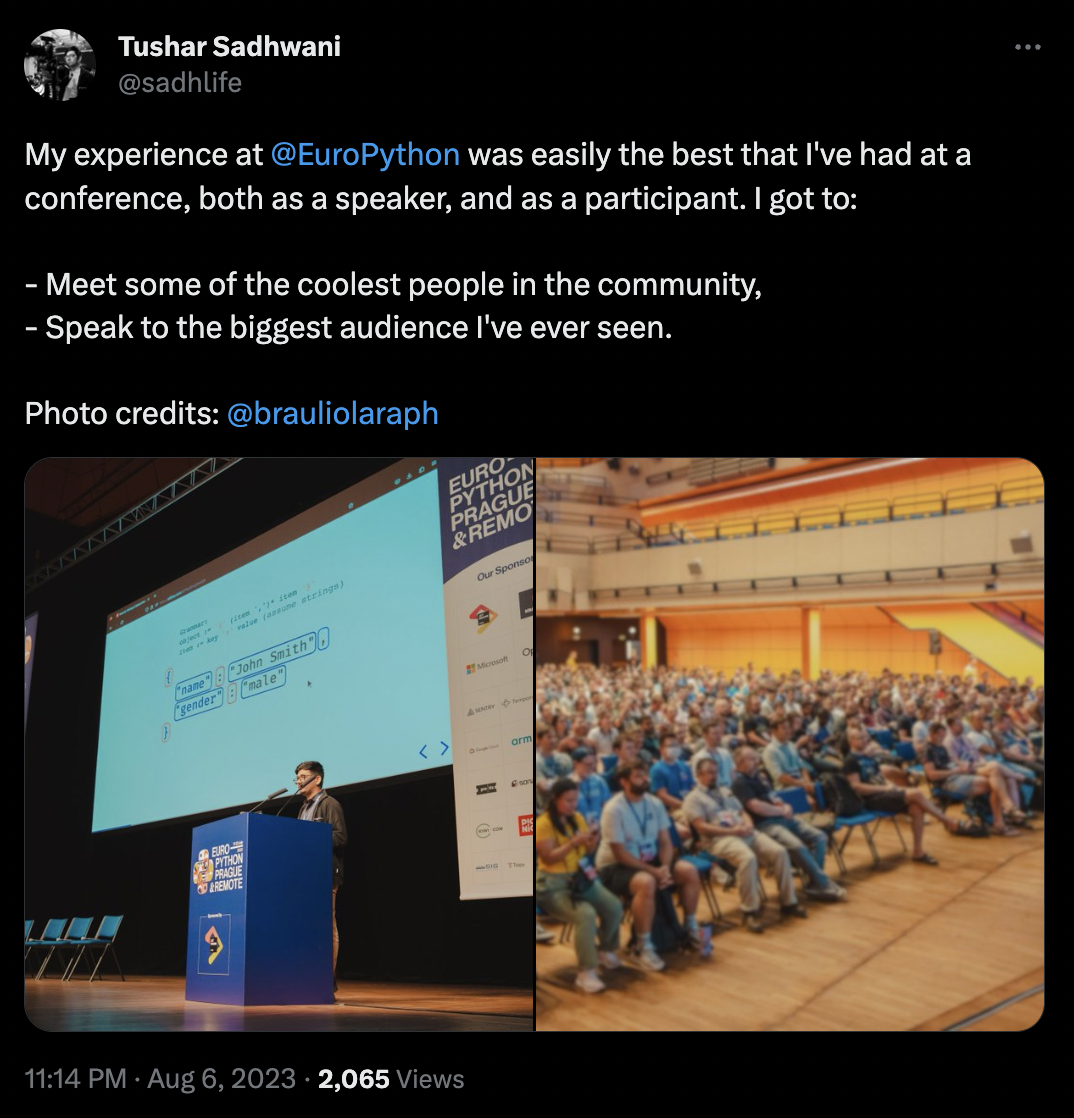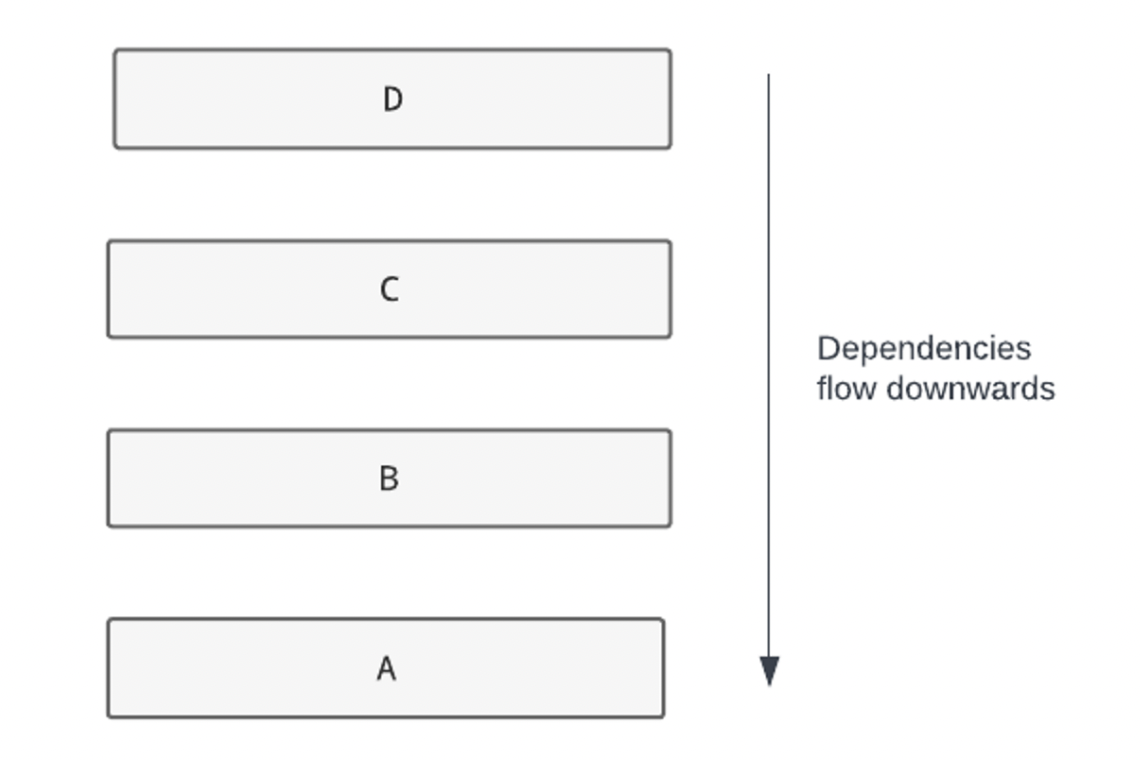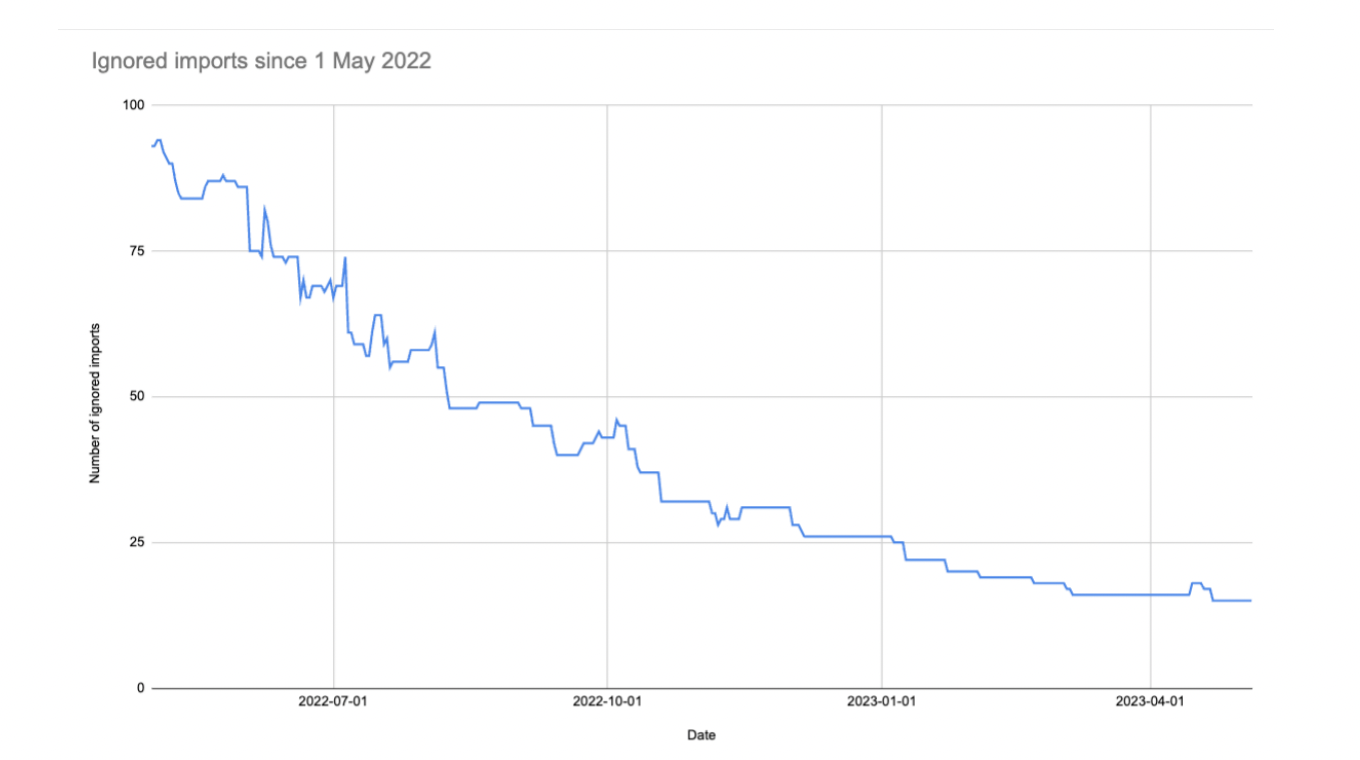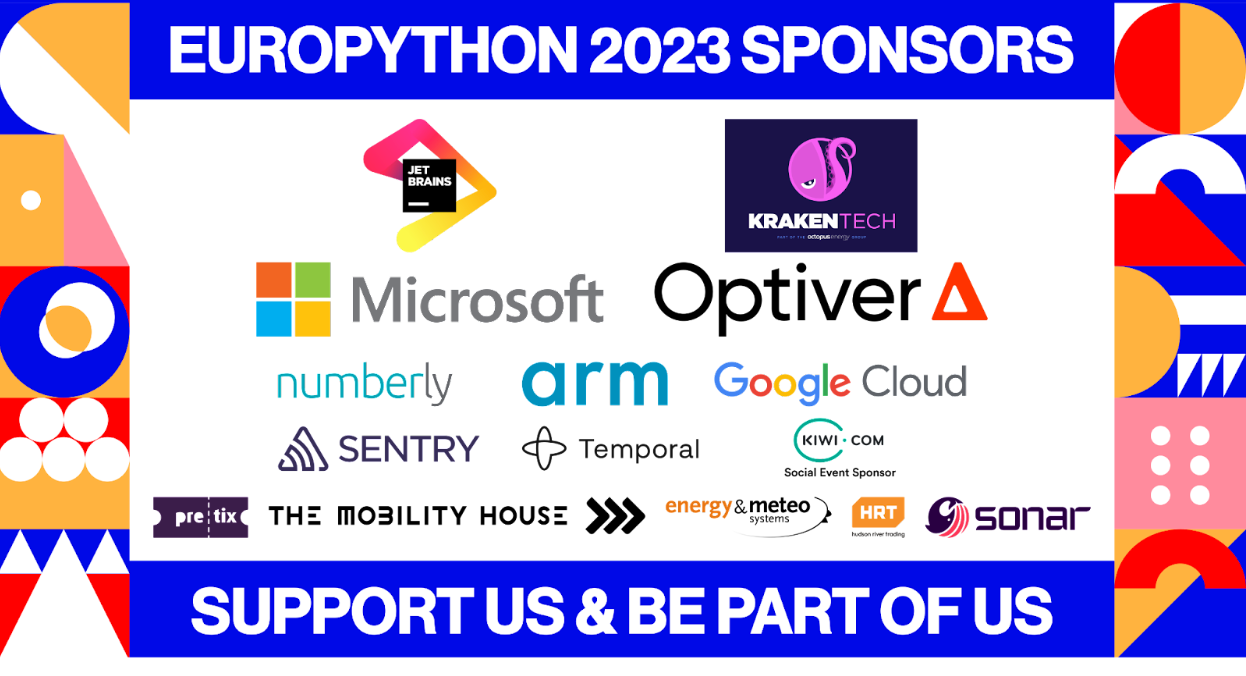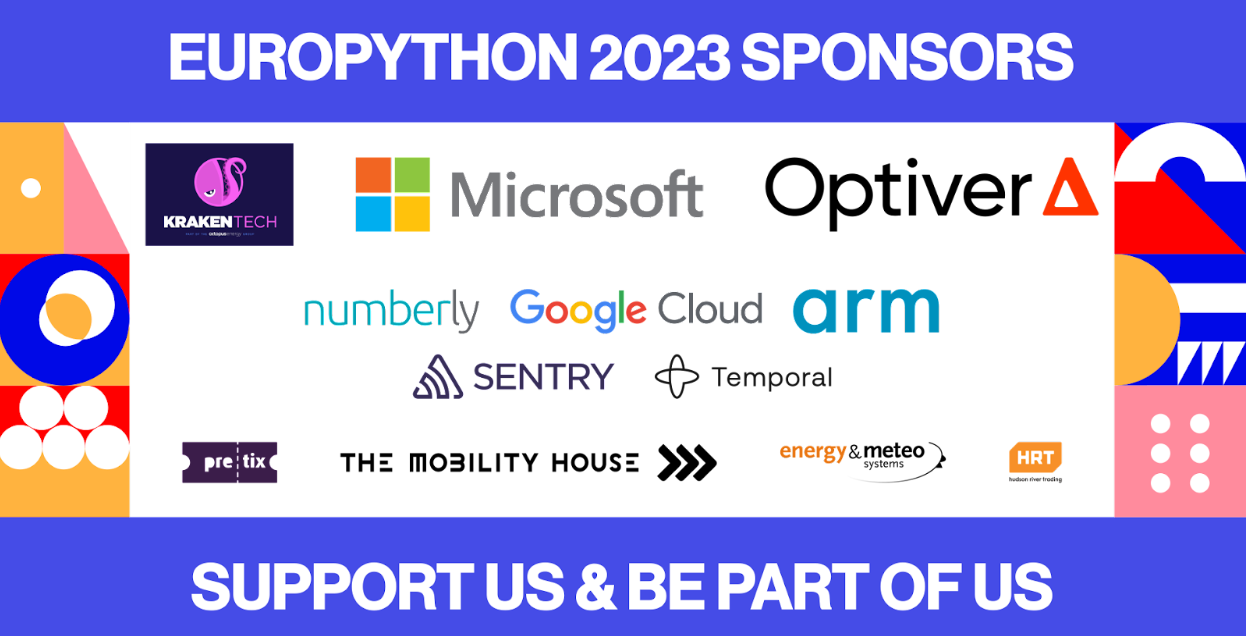Hello, Python enthusiasts! 👋
Guess what? We're on the home stretch now, with less than 100 days left until we all rendezvous in the enchanting city of Prague for EuroPython 2024!

Can you feel the excitement tingling in your Pythonic veins?
Let’s look up what's been cooking in the EuroPython pot lately. 🪄🍜
📣 Programme
The curtains have officially closed on the EuroPython 2024 Call for Proposals! 🎬
We've hit records with an incredible 627 submissions this year!! 🎉
Thank you to each and every one of you brave souls who tossed your hats into the ring! 🎩 Your willingness to share your ideas has truly made this a memorable journey.
🗃️ Community Voting
EuroPython 2024 Community Voting was a blast!
The Community Voting is composed of all past EuroPython attendees and prospective speakers between 2015 and 2024.
We had 297 people contributing, making EuroPython more responsive to the community’s choices. 😎 We can’t thank you enough for helping us hear the voice of the Community.
Now, our wonderful programme crew along with the team of reviewers and community voters have been working hard to create the schedule for the conference! 📋✨
💰 Sponsor EuroPython 2024
EuroPython is a volunteer-run, non-profit conference. All sponsor support goes to cover the cost of running the Europython Conference and supporting the community with Grants and Financial Aid.
If you want to support EuroPython and its efforts to make the event accessible to everyone, please consider sponsoring (or asking your employer to sponsor).
Sponsoring EuroPython guarantees you highly targeted visibility and the opportunity to present your company to one of the largest and most diverse Python communities in Europe and beyond!
There are various sponsor tiers and some have limited slots available. This year, besides our main packages, we offer add-ons as optional extras. For more information, check out our Sponsorship brochure.
🐦 We have an Early Bird 10% discount for companies that sign up by April 15th.🐦
More information at: https://ep2024.europython.eu/sponsor 🫂 Contact us at sponsoring@europython.eu
🎟️ Ticket Sales
The tickets are now open to purchase, and there is a variety of options:
- Conference Tickets: access to Conference and Sprint Weekends.
- Tutorial Tickets: access to the Workshop/Tutorial Days and Sprint Weekend (no access to the main conference).
- Combined Tickets: access to everything during the whole seven-day, i.e. workshops, conference talks and sprint weekend!
We also offer different payment tiers designed to answer each attendee's needs. They are:
Business Tickets: for companies and employees funded by their companies
- Tutorial Only Business (Net price €400.00 + 21% VAT)
- Conference Only Business (Net price €500.00 + 21% VAT)
- Late Bird (Net price €750.00 + 21% VAT)
- Combines Business (Net price €800.00 + 21% VAT)
- Late Bird (Net price €1200.00 + 21% VAT)
Personal Tickets: for individuals
- Tutorial Only Personal (€200.00 incl. 21%VAT)
- Conference Only Personal (€300.00 incl. 21% VAT)
- Late Bird (€450.00 incl. 21% VAT)
- Combined Personal (€450.00 incl. 21% VAT)
- Late Bird (€675.00 incl. 21% VAT)
Education Tickets: for students and active teachers (Educational ID is required at registration)
- Conference Only Education (€135.00 incl. 21% VAT)
- Tutorial Only Education (€100.00 incl. 21% VAT)
- Combined Education (€210.00 incl. 21% VAT)
Fun fact: Czechia has been ranked among the world's top 20 happiest countries recently.
Seize the chance to grab an EP24 ticket and connect with the delightful community of Pythonistas and happy locals this summer! ☀️
Need more information regarding tickets? Please visit https://ep2024.europython.eu/tickets or contact us at helpdesk@europython.eu.
⚖️ Visa Application
If you require a visa to attend EuroPython 2024 in Prague, now is the time to start preparing.
The first step is to verify if you require a visa to travel to the Czech Republic.
The Czech Republic is a part of the EU and the Schengen Area. If you already have a valid Schengen visa, you may NOT need to apply for a Czech visa. If you are uncertain, please check this website and consult your local consular office or embassy. 🏫
If you need a visa to attend EuroPython, you can lodge a visa application for Short Stay (C), up to 90 days, for the purpose of “Business /Conference”. We recommend you do this as soon as possible.
Please, make sure you read all the visa pages carefully and prepare all the required documents before making your application. The EuroPython organisers are not able nor qualified to give visa advice.
However, we are more than happy to help with the visa support letter issued by the EuroPython Society. Every registered attendee can request one; we only issue visa support letters to confirmed attendees. We kindly ask you to purchase your ticket before filling in the request form.
For more information, please check https://ep2024.europython.eu/visa or contact us at visa@europython.eu. ✈️
💶 Financial Aid
We are also pleased to announce our financial aid, sponsored by the EuroPython Society. The goal is to make the conference open to everyone, including those in need of financial assistance.
Submissions for the first round of our financial aid programme are open until April 21st 2024.
There are three types of grants including:
- Free Ticket Voucher Grant
- Travel/Accommodation Grant (reimbursement of travel costs up to €400.)
- Visa Application Fee Grant (up to €80)
⏰ FinAid timeline
If you apply for the first round and do not get selected, you will automatically be considered for the second round. No need to reapply.
| 8 March 2024 | Applications open | |
| 21 April 2024 |  | Deadline for submitting first-round applications |
| 8 May 2024 |  | First round of grant notifications |
| 12 May 2024 |  | Deadline to accept a first-round grant |
| 19 May 2024 |  | Deadline for submitting second-round applications1 |
| 5 June 2024 |  | Second round of grant notifications |
| 12 June 2024 |  | Deadline to accept a second-round grant |
| 21 July 2024 | Deadline for submitting receipts/invoices |
Visit https://europython.eu/finaid for information on eligibility and application procedures for Financial Aid grants.
🎤 Public Speaking Workshop for Mentees
We are excited to announce that this year’s Speaker Mentorship Programme comes with an extra package!
We have selected a limited number of mentees for a 5-week interactive course covering the basics of a presentation from start to finish.
The main facilitator is the seasoned speaker Cheuk Ting Ho and the participants will end the course by delivering a talk covering all they have learned.
We look forward to the amazing talks the workshop participants will give us. 🙌
🐍 Upcoming Events in Europe
Here are some upcoming events happening in Europe soon.
Czech Open Source Policy Forum: Apr 24, 2024 (In-Person)
Interested in open source and happen to be near Brno/Czech Republic in April? Join the Czech Open Source Policy Forum and have the chance to celebrate the launch of the Czech Republic's first Open Source Policy Office (OSPO). More info at: https://pretix.eu/om/czospf2024/
OSSCi Prague Meetup: May 16, 2024 (In-Person)
Join the forefront of innovation at OSSci Prague Meetup, where open source meets science. Call for Speakers is open! https://pydata.cz/ossci-cfs.html
PyCon DE & PyData Berlin: April 22-24 2024
Dive into three days of Python and PyData excellence at Pycon DE! Visit https://2024.pycon.de/ for details.
PyCon Italy: May 22-25 2024
PyCon Italia 2024 will happen in Florence. The schedule is online and you can check it out at their nice website: https://2024.pycon.it/
GeoPython 2024: May 27-29, 2024
GeoPython 2024 will happen in Basel, Switzerland. For more information visit their website: https://2024.geopython.net/
🤭 Py.Jokes
Can you imagine our newsletter without joy and laughter? We can’t. 😾🙅♀️❌ Here’s this month's PyJoke:
pip install pyjokesimport
pyjokesprint(pyjokes.get_joke())
How many programmers does it take to change a lightbulb?
None, they just make darkness a standard!
🐣 See You All Next Month
Before saying goodbye, thank you so much for reading this far.
We can’t wait to reunite with all you amazing people in beautiful Prague again.
Let me remind you how pretty Prague is during summer. 🌺🌼🌺

Remember to take good care of yourselves, stay hydrated and mind your posture!
Oh, and don’t forget to force encourage your friends to join us at EuroPython 2024! 😌
Looking forward to meeting you all here next month!
With much joy and excitement,
EuroPython 2024 Team 🤗





